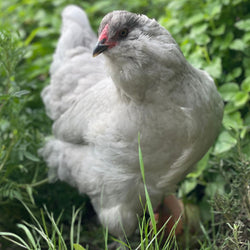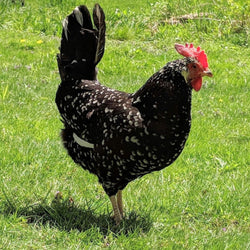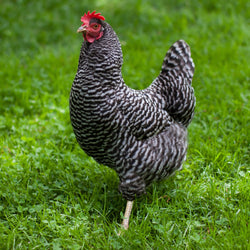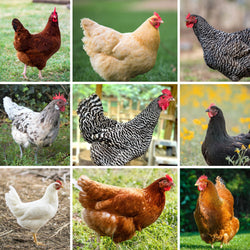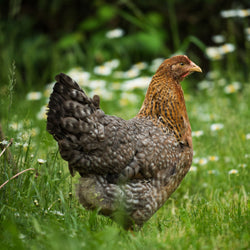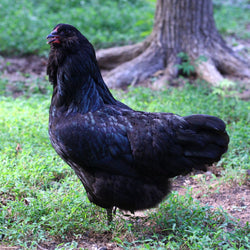f=menu&page=25/--
Frequently Asked Questions
Here we answer the most commonly-asked questions about ordering, chicken care, and more.
Why is my chick's beak getting crooked, and what should I do?
Usually, chickens with crossed beaks or scissor beaks lead long, normal lives. In most cases, this defect is caused by the chick positioning herself incorrectly for hatching. Normally, one wing will shelter the head inside the shell. But if a chick doesn't have her wing positioned over her head, the skull can malform, and it will reveal itself within the first few weeks as a cross beak or scissor beak as she begins to grow. What causes this problem isn't fully understood. Think of it as sort of the chicken equivalent of a breech birth: the chick has just not...
Read MoreDo you ship eggs or chicks internationally?
No. If you want to purchase live birds or fertile eggs, you will need to find a local supplier to help you; we do not ship internationally. (We don't even ship non-live items internationally.) If there is no local supplier and you want to go to the effort of importing chickens or fertile eggs into your country, you should be aware that it's not an easy process. Plus, we still can't help you--we don't export or ship internationally. We get asked often enough that we can provide some advice, though. First, you will need to check to see what customs...
Read MoreWhat do I need to know about snapping turtles if I keep chickens?
Name: Snapping turtles Chelydra serpentina or Macrochelys temminckii Description: Snapping turtles are large freshwater turtles . Common snapping turtles weight up to 75 pounds, but generally average around 35 pounds for an adult. Alligator snapping turtles have weighed up to 249 pounds in captivity, but in the wild *only* get to be as large as 175 pounds or so. Still giant! Distribution/Habitat: Found in eastern and southeastern North America Hunting Behavior: These are uncommon predators of chickens, although they may pose problems for you if you have snapping turtles in your area. Females especially are known to travel relatively far...
Read MoreWhat do I need to know about birds of prey if I keep chickens?
As a flock-keeper, it is important to know that birds of prey, including raptors who hunt in daylight like eagles and hawks, and owls who hunt at night, will definitely kill and eat chickens in your flock if given the opportunity. Birds of prey come in many different sizes and colors, and various species are found throughout the world. This article will help you understand their hunting behavior and give you tips to help protect your flock from their aerial assault. How birds of prey hunt Unlike the most ground-bound predators of chickens (which may kill many birds or an...
Read MoreWill the chicks I buy from you be related to each other? I want to breed my rooster with my hens, so I don't want them to be related.
Our breeding flocks are very large. We can't know which chicks hatch from which eggs. Even if we could, we don't keep track of which hen laid which egg, and we can't know which rooster fertilized which eggs, either. However, if you purchase birds from My Pet Chicken or some other major hatchery, generally speaking you can probably presume that the flocks are large enough to breed your birds together at home. Hatcheries understand that's what people want to do, so they keep breeding flocks with plenty of genetic diversity for breeding future generations. If you purchase birds from a...
Read MoreWhy are grocery store eggs so flat compared to eggs from my hens?
Eggs from your own hens normally have very "tall" yolks because they can be so very fresh! It's not because they are pasture raised, though. The nutritional content for your own eggs when your hens have access to pasture is much better than regular "grocery store eggs." You can visually observe the difference between eggs from hens raised on pasture and eggs from factory farmed birds, because pasture raised birds will have yolks that are dark and orange, as opposed to the sickly pale yellow of grocery store eggs. Notice that in the photo above? That's the natural color of...
Read MoreAre oversized eggs that are difficult for my hens to pass caused by overfeeding?
It is not likely that the problem is overfeeding. We recommend feeding free choice and not limiting their feed: underfeeding usually causes more problems than offering extra. It is rare for a layer to overeat ("meat" birds like the sickly Cornish Rock crosses are different, and often overeat). If it really concerns you, you might cease fatty treats, or perhaps double check the protein level in your food. Around 16% protein or so is good for layers, so if your protein level is higher than that, you might switch to a slightly lower protein feed. For the most part, though,...
Read MoreAre sold out breeds ever included in a hatchery choice assortment?
Breeds that are not available individually may still be used to fulfill assortments, since the assortments consist of breeds that have hatched better than we predicted on a given hatch day. In other words, assortments can certainly be (and often are) fulfilled with otherwise sold out breeds, because once we've provided for the orders reserved for that week, we can use the remaining birds for assortments. This is a function of having to literally count our chickens before they've hatched: when making our availability estimates, we are conservative so we can avoid disappointing anyone who has reserved a specific breed....
Read More







"The Clubhouse" Coop
Easy to assemble and built to last, the Clubhouse Coop is the perfect starter coop for a small flock.

